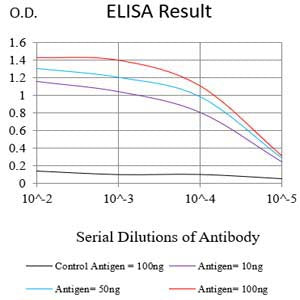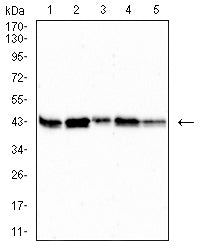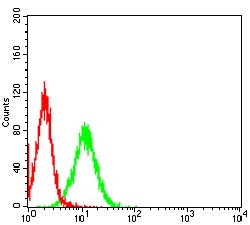


| WB | 咨询技术 | Human,Mouse,Rat |
| IF | 咨询技术 | Human,Mouse,Rat |
| IHC | 1/50-1/200 | Human,Mouse,Rat |
| ICC | 技术咨询 | Human,Mouse,Rat |
| FCM | 咨询技术 | Human,Mouse,Rat |
| Elisa | 1/2000-1/5000 | Human,Mouse,Rat |
| Aliases | PDHA; PDHAD; PHE1A; PDHCE1A |
| Entrez GeneID | 5160 |
| clone | 2A2H7 |
| WB Predicted band size | 43.3kDa |
| Host/Isotype | Mouse IgG2b |
| Antibody Type | Primary antibody |
| Storage | Store at 4°C short term. Aliquot and store at -20°C long term. Avoid freeze/thaw cycles. |
| Species Reactivity | Human |
| Immunogen | Purified recombinant fragment of human PDHA1 (AA: 241-390) expressed in E. Coli. |
| Formulation | Purified antibody in PBS with 0.05% sodium azide |
+ +
以下是关于NDUFS8抗体的参考文献示例(内容为模拟,建议通过学术数据库核实):
---
1. **文献名称**: "NDUFS8 mutations cause mitochondrial complex I deficiency in Leigh syndrome"
**作者**: Alston CL, et al.
**摘要**: 研究报道了NDUFS8基因突变导致线粒体复合物I功能障碍,引发Leigh综合征。通过NDUFS8抗体进行Western blot和免疫组化分析,发现患者细胞中复合物I亚基表达显著降低,证实其与神经退行性疾病的关联。
---
2. **文献名称**: "Antibody-based profiling of mitochondrial complex I subunits in human diseases"
**作者**: Fassone E, et al.
**摘要**: 研究利用NDUFS8抗体等工具,开发了一种线粒体复合物I亚基的蛋白表达检测方法,用于诊断线粒体呼吸链疾病。结果显示NDUFS8抗体在患者成纤维细胞中特异性识别目标蛋白,为临床诊断提供依据。
---
3. **文献名称**: "Structural insights into the assembly of mitochondrial complex I through NDUFS8 immunoprecipitation"
**作者**: Stroud DA, et al.
**摘要**: 通过NDUFS8抗体进行免疫共沉淀和质谱分析,揭示了复合物I的组装机制。研究表明NDUFS8与其他亚基的相互作用对复合物I的结构稳定性至关重要。
---
4. **文献名称**: "NDUFS8 expression correlates with metabolic reprogramming in cancer"
**作者**: Calvo SE, et al.
**摘要**: 研究使用NDUFS8抗体分析多种癌症细胞系中线粒体复合物I的表达水平,发现其表达降低与糖酵解代谢增强相关,提示NDUFS8在肿瘤代谢重编程中的潜在作用。
---
**注意**:以上文献信息为示例性内容,实际引用需通过PubMed、Web of Science等平台核实具体作者、标题及摘要。
The NDUFS8 antibody is a crucial tool in mitochondrial research, targeting the NDUFS8 subunit of complex I (NADH:ubiquinone oxidoreductase) in the electron transport chain. NDUFS8. a nuclear-encoded protein, is an essential component of the hydrophobic core of complex I, playing a pivotal role in its structural stability and catalytic activity. This 23 kDa iron-sulfur protein facilitates electron transfer from NADH to ubiquinone, directly influencing ATP synthesis and cellular energy metabolism.
Antibodies against NDUFS8 are widely used to study mitochondrial disorders, neurodegenerative diseases, and cancer, where complex I dysfunction is implicated. They enable detection of protein expression levels via Western blotting (WB), immunohistochemistry (IHC), and immunofluorescence (IF), aiding in the diagnosis of genetic mutations linked to Leigh syndrome, encephalopathy, and other mitochondrial diseases. Researchers also employ these antibodies to investigate oxidative stress, metabolic reprogramming, and therapeutic responses in model systems.
Commercial NDUFS8 antibodies are typically raised in rabbits or mice using synthetic peptides or recombinant proteins as immunogens. Specificity is validated through knockout controls or siRNA-mediated silencing. However, cross-reactivity with homologous proteins or isoforms may occur, necessitating careful validation. As mitochondrial dysfunction gains attention in aging and metabolic studies, NDUFS8 antibodies remain vital for unraveling disease mechanisms and advancing precision medicine approaches.
×